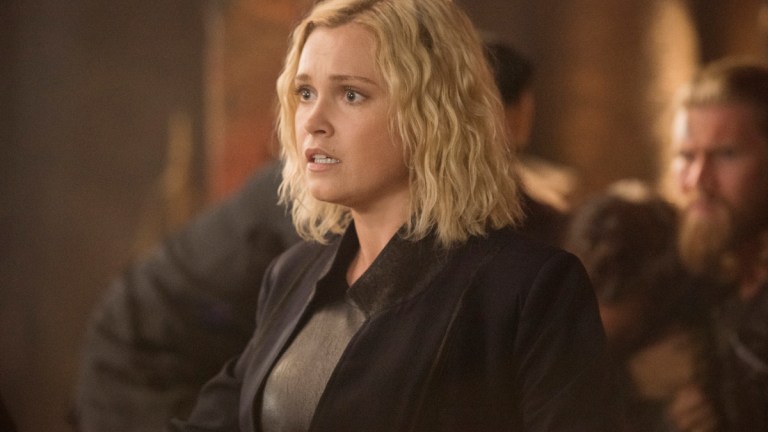The 100 Season 7 Episode 3 Review: False Gods
Sheidheda makes his true villainous debut and Raven gets a taste of post-apocalyptic leadership while Clarke tries to keep Sanctum under control

This THE 100 review contains spoilers
The 100 Season 7 Episode 3
First, it must be said that it is deeply weird to write about something as frivolous as a television right now, especially a post-apocalyptic show where people are discussing riots and whether political violence is acceptable. Second, I will not be attempting to draw some sort of bizarre connection between the two because that ain’t it, chief. Not all weird coincidences are allegories, ya know?
This episode did an important job in that it started shading in some color when it comes to the various factions around Sanctum. The convicts were developed from an anonymous mass into people with backstories who we at least don’t want to see led off to slaughter in the space of just two episodes. Even the couple we meet during the cold open felt fully realized as we watched their doom. Bringing the characters we already know, even peripherally, like Delilah’s parents, into the conflict, was also a smart move.
After spending a season or more skewering Clarke for her moral failings, Raven finally found out what it felt like to be the one in charge when faced with an impossible decision, and she didn’t seem to enjoy it. Much like several of Clarke’s choices, Raven actually had more options than she thought. She called Murphy Emori’s moral compass (not for seasons!) but Emori could have been hers, as she offered up the logical and humane option of telling the workers that they were doomed. Like Clarke, knowing she did wrong made her a sullen glutton for punishment, which is probably why she took the beating from Nix without complaint. It’ll be interesting to see how this experience changes Raven’s view of Clarke – and Murphy and Emori’s view of Raven.
Both Murphy and Emori made sacrifices here, but within very different contexts. Granted, they knew they had a layer of protection due to their nightblood, but for one thing, they knew Raven was being deliberately evasive about how bad the consequences were for the convicts and she later downplayed Emori’s condition, so Murphy probably wasn’t feeling all that confident in his biological protection. Luisa D’Oliveira plays Emori proudly making an informed sacrifice for her people. On the other hand, Richard Harmon’s flat affect once Raven locks him in to finish the job says it all. He’s still working off that karmic debt to keep from going to hell (per his vision last season), but that doesn’t mean he and Raven are cool.
It’s a bit surprising how quickly Wonkru found out about the flame, although Gaia has always valued honored highly. Perhaps this signifies her full conversion from fleimkepa to nomon (mother). It could also be filed under “The 100 churns through plot faster than I expect, yet it surprises me every season.” But what does this mean for Wonkru long term, beyond an unwillingness to take scut work that they suspected was more dangerous than Raven was letting on? And if it turns out that Madi has a bit more of the commanders still left in her head, will that change anything?
The fact that Gaia and Clarke buried the flame and Abby’s ring together, apart from anyone else, feels like a meaningful step in their relationship as trusted coparents. Perhaps the fact that Clarke wasn’t previously close to Gaia – and that Gaia has her own complicated mother-daughter relationship – is part of what makes it easier for Clarke to open up. Either way, Madi was onto something. It’s better for both of them to have somewhere to put their grief and someone to share it with. Once again, The 100 is showing a very different model for what parenting and a family can be, and I’m glad to see the good it brings into the lives of the characters.
Sheidheda turns out to be a worthy opponent for his first outing, at least in this game of cat and mouse that’s oddly reminiscent of Lexa playing the role of a servant girl in manacles. History doesn’t repeat, but it rhymes. He effectively reads the situation and manipulates Jordan, Clarke, and everyone else to make himself far more powerful than he already was. After hearing about this master strategist for well over a season (and occasionally watching him play Grounder chess with Madi in her mind), it was good to finally see his skills in action. But next time, I’d like to learn more about him, and the bounds of his knowledge – does he have all of Russell’s memories after sitting sidecar for a little while? That would certainly make him more dangerous…
Other notes…
- There’s trouble for Miller and Jackson, who thinks he should be “better” than his boyfriend, because he’s a doctor instead of a soldier. Ouch.
- Gaia is called a traitor who sinned against them all – does this spell trouble for her political capital and physical safety?
- How many blond women on TV right now have those side braids? I miss you already, Motherland: Fort Salem!
- The class hierarchy in this new version of Sanctum is so real! How long will Clarke and co. pretend the only thing you need for a “better” world is a lack of violence?
- Has anyone ever eaten a cookie as menacingly as JR Bourne? There’s gotta be a “How long until chocolate cake gets hung upside down and and drained for their blood?” joke in there somewhere, but I leave that honorable work to you, mighty comments section.